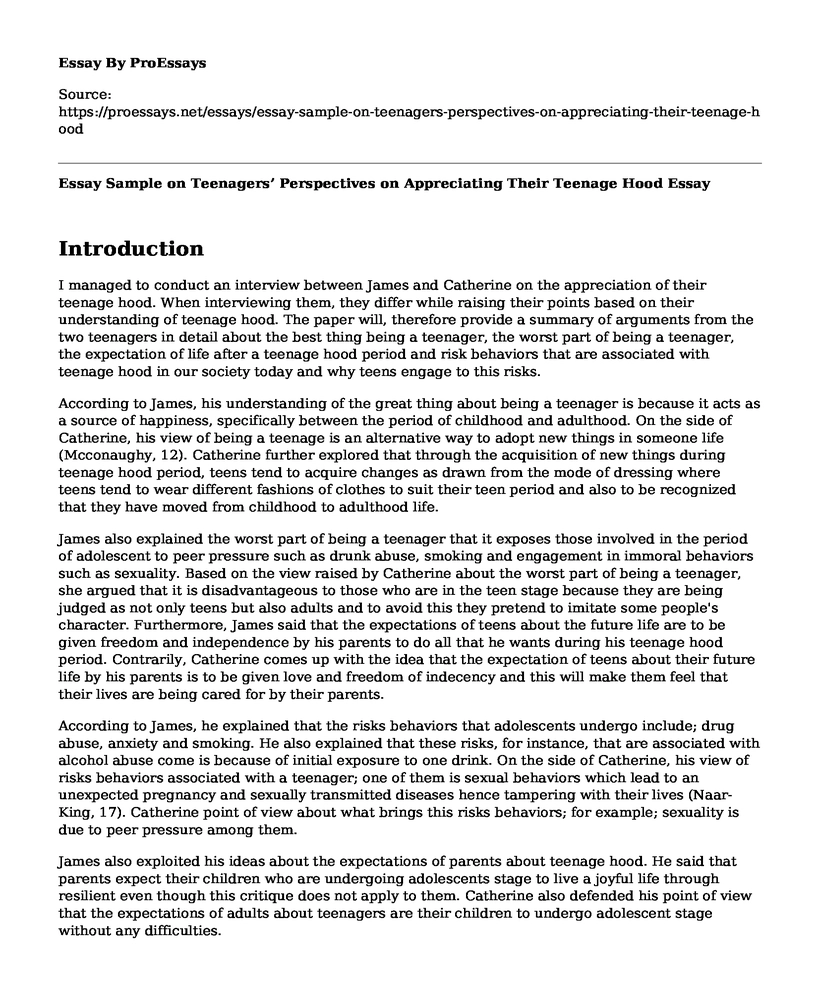Introduction
I managed to conduct an interview between James and Catherine on the appreciation of their teenage hood. When interviewing them, they differ while raising their points based on their understanding of teenage hood. The paper will, therefore provide a summary of arguments from the two teenagers in detail about the best thing being a teenager, the worst part of being a teenager, the expectation of life after a teenage hood period and risk behaviors that are associated with teenage hood in our society today and why teens engage to this risks.
According to James, his understanding of the great thing about being a teenager is because it acts as a source of happiness, specifically between the period of childhood and adulthood. On the side of Catherine, his view of being a teenage is an alternative way to adopt new things in someone life (Mcconaughy, 12). Catherine further explored that through the acquisition of new things during teenage hood period, teens tend to acquire changes as drawn from the mode of dressing where teens tend to wear different fashions of clothes to suit their teen period and also to be recognized that they have moved from childhood to adulthood life.
James also explained the worst part of being a teenager that it exposes those involved in the period of adolescent to peer pressure such as drunk abuse, smoking and engagement in immoral behaviors such as sexuality. Based on the view raised by Catherine about the worst part of being a teenager, she argued that it is disadvantageous to those who are in the teen stage because they are being judged as not only teens but also adults and to avoid this they pretend to imitate some people's character. Furthermore, James said that the expectations of teens about the future life are to be given freedom and independence by his parents to do all that he wants during his teenage hood period. Contrarily, Catherine comes up with the idea that the expectation of teens about their future life by his parents is to be given love and freedom of indecency and this will make them feel that their lives are being cared for by their parents.
According to James, he explained that the risks behaviors that adolescents undergo include; drug abuse, anxiety and smoking. He also explained that these risks, for instance, that are associated with alcohol abuse come is because of initial exposure to one drink. On the side of Catherine, his view of risks behaviors associated with a teenager; one of them is sexual behaviors which lead to an unexpected pregnancy and sexually transmitted diseases hence tampering with their lives (Naar-King, 17). Catherine point of view about what brings this risks behaviors; for example; sexuality is due to peer pressure among them.
James also exploited his ideas about the expectations of parents about teenage hood. He said that parents expect their children who are undergoing adolescents stage to live a joyful life through resilient even though this critique does not apply to them. Catherine also defended his point of view that the expectations of adults about teenagers are their children to undergo adolescent stage without any difficulties.
On matters corning addressing family issues, James displayed some aspects concerning parentage as drawn from his conversation. He expects that adolescents are considered as no marital and childbearing, and as a result, they are not able to qualify to be future parents. Contrarily, Catherine also termed teenagers as abstainers of marriage. James also appreciated the importance of a family as a source of security to teenagers. Also, Catherine said that the family not only safeguard adolescents, but it also makes teenagers experience mutual love. James also expects family life to possess some kinds of interactions between teenagers and their parents. Catherine claimed that teenagers expect a brighter family through the provision of support by their parents.
According to the opinion raised by James, based on the relationship between his close friends, for instance, the issue concerning a romantic partner. He said that friends would monitor themselves when they have engaged with other partners as in if they think that one of the partners is ugly, they will inform the other partner. Catherine, also argued that at teenage hood period there are pretend-ships from friends and gossips which symbolizes lack of trust among your friends.
James also said that teenagers should gain some of the virtues, for instance, effective communicative skills to help them become successful and similarly to expose them to good parentage. On the other hand, Catherine concluded that teenagers should not only incorporate communications skills but also they should put concern on their growth development in their respective habitats.
Works Cited
Mcconaughy, Stephanie H. Clinical Interviews for Children and Adolescents - Assessment to Intervention. , 2013. Print.
Naar-King, Sylvie, and Mariann Suarez. Motivational Interviewing with Adolescents and Young Adults. New York: Guilford Press, 2010. Internet resource.
Cite this page
Essay Sample on Teenagers' Perspectives on Appreciating Their Teenage Hood. (2023, Jan 14). Retrieved from https://proessays.net/essays/essay-sample-on-teenagers-perspectives-on-appreciating-their-teenage-hood
If you are the original author of this essay and no longer wish to have it published on the ProEssays website, please click below to request its removal:
- Article Review About Taiwanese Community
- Youth in Socioeconomically Disadvantaged Areas Paper Example
- Essay Example on Religious Donations: Older Generations Lead, Young Follow
- Essay Sample on Paul's Teaching on Marriage & Immorality in the Pastoral Epistles
- Essay on Fairness & Equality: Defining Distributive Justice & Its Impact
- Essay Example on Aging Out: The Process of Leaving Foster Care
- Essay on Interpersonal Communication: A Vital Tool for Stress Management in the Workplace







